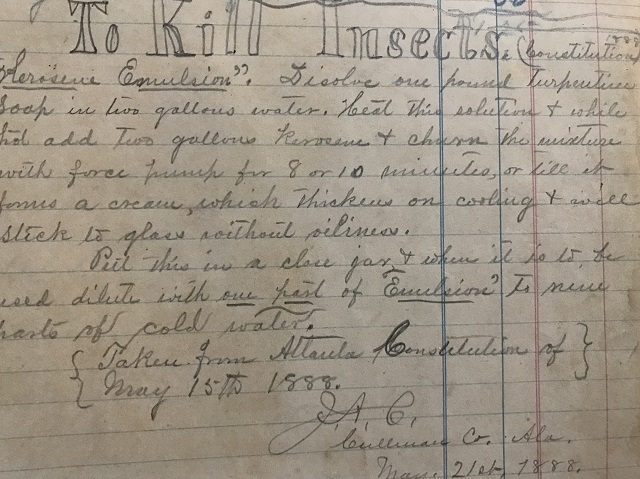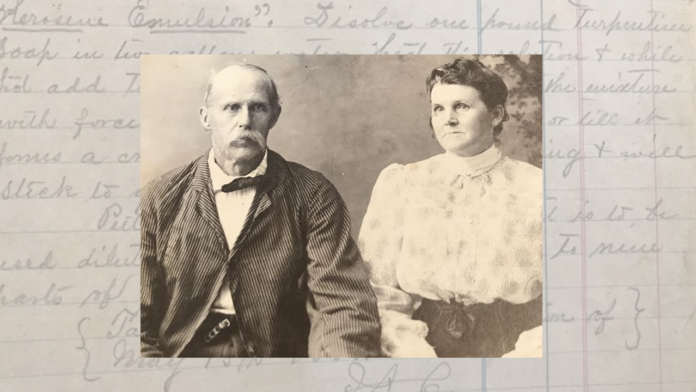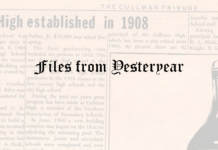VINEMONT, Ala. – When Steve and Carol Wunderlich were recently tasked with cleaning out Steve’s family’s homestead, they never imagined the treasures they would find. They shared their discoveries with their friends in the Vinemont Historical Society at a recent meeting. Among their finds were ledgers from Jared Alexander (J.A.) Callaham, Steve’s great-grandfather, written between 1874-1894.
Callaham was born in March 1841 and died in 1913. He was enlisted as a 1st Sergeant in Company E of Lewis’ Battalion of the Alabama Cavalry. It is noted in Robin Sterling’s book “Cullman County, Alabama Confederate Soldiers,” “His service records and Federal Census recorded the surname Callahan; however, his tombstone and others of his family in the cemetery recorded the name Callaham.”
Callaham and his wife, Eva Porter Callaham, lived in what is now Vinemont. During the time of the earlier journal entries, Cullman County had not been created and the area was still the northern portion of Blount County. J.A. and Eva Callaham are buried at Mt. Zion United Methodist Church Cemetery in Cullman County.
The ledger gives insights into the area’s past as Callaham, a teacher and business owner, wrote his thoughts on daily happenings, business transactions, school records and many other things he found to be noteworthy. His entries are written in near perfect penmanship in both ink and pencil within a bound hard-covered ledger of numbered and lined pages. Several of the pages have been torn out, but many of them remain.
The ledger shows that Callaham sold a large quantity of shingles and kept detailed records of those transactions. Some might recognize their own family among those who did business with Callaham: D.H. Alvis, J.J. Coggin and James and William Stuart were just a few of his customers in 1874.
School records from Cedar Grove and Pine Grove are written on page 20 with a list of teachers from 1868-1870. James Livingston, John Jett and Vincent Jones were just a few of the teachers at the schools.
While much of the ledger keeps official school and business records, at times Callaham uses the book as a diary.
He wrote April 9, 1894:
Last night a set of real bad boys
Collected at the Gap
And stole a ride to Decatur
And while enjoying all their joys,
They lost a member, Otto Wetzell.
If they had let the train alone,
And done as boys should do,
They would not have to wish and mourn
And all their actions rue.
What is the matter with the boys,
The hope of all the land.
Destroy the hope and all the joys
Of parents on every hand.
Callaham seems to have chosen poetry to express his thoughts about a tragedy that befell his community. Otto Wetzell was just 18 years old when he passed away. He is also buried at Mt. Zion Methodist Church.
Callaham also kept detailed records of the planting of his gardens and land.
On a page he has titled “Garden Memorandum of 1880,” he writes:
Feb 27-
- Planted Early Rose Irish potatoes in garden, all of S.W. garden and 5 rows in south side of S.E. garden
- Planted mustard and turnips on walks of entire S.W. garden
- Planted Lettuce (Golden Stone Head) on west side of the S.E garden
- Planted white multiplying onions, 8 or 10 rows in the S.E. garden
Mar 30
- Planted parsley, early cluster cucumber and celery, on south walk of N.W, garden
- Planted potatoes, 2 rows in the S.E garden, one row in the N.E garden
- Planted tomato and White Spine cucumber- Tomato on the south side of the N.E, garden and beets near pasture bed
April 5
- Planted early cabbage seed and bedded sweet potatoes
Callaham was also sure to make note of recipes and other good advice he received from people he met.
He wrote:
To Preserve Young Trees from Rabbits– Make a mixture of soft soap and sulphin to thick paste and apply occasionally with brush in winter. January 1875
To Destroy Ants and Crickets– A small portion of carbonic acid, dilute it in twelve times as much water. Squirt in and about infested places. They quit and return no more. (Weekly Louisville Ledger)
To have plenty of eggs in winter– Fowls must have warm roosting and nesting places, animal food and if possible, warm food, gravel and lime, and clean houses. Lice may be killed by lard 100 parts and carbonic acid 1 part proportion. Sitting hens should never be greased as the eggs will not hatch. (Southern Plantation- Jan, 22, 1875)
TO KILL INSECTS (Constitution 1888) “Kerosene Emulsion”
Dissolve one pound turpentine soap in two gallons water. Heat this solution and while hot, add two gallons kerosene and churn the mixture with force pump for 8 or 10 minutes, or till it forms a cream, which thickens on cooling and will stick to glass without oiliness.
Put this in a glass jar and when it is to be used, dilute with one part of Emulsion to nine parts of cold water.
Taken from Atlanta Constitution of May 15th 1888
J.A.C.
Cullman County, Ala.
May 21st 1888
To be continued…
Copyright 2019 Humble Roots, LLC. All Rights Reserved.

























